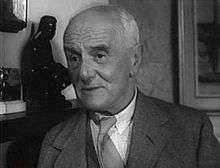Hugo Dyson
Henry Victor Dyson Dyson (7 April 1896 – 6 June 1975), generally known as Hugo Dyson and who signed his writings H. V. D. Dyson, was an English academic and a member of the Inklings literary group. He was a committed Christian, and together with J. R. R. Tolkien, he helped C. S. Lewis in converting to Christianity,[1] particularly after a long conversation as they strolled on Addison's Walk at Oxford.
Hugo Dyson | |
|---|---|
 Dyson in 1964/5 (in a still from the film Darling) | |
| Born | 7 April 1896 |
| Died | 6 June 1975 (aged 79) |
| Occupation | Scholar |
| Genre | Shakespearian Literature |
Career
Academia
Dyson taught English at the University of Reading from 1924 until obtaining a fellowship with Merton College, Oxford in 1945.[2] His students at Oxford included the later cultural theorist Stuart Hall, whom he tutored in the early 1950s.[3] Dyson retired in 1963 but returned as emeritus fellow in 1969, teaching the newly introduced "modern" literature paper. His tutorials were notable because many of the writers he discussed had been personal friends.
Works
Dyson was not a prolific writer, but the quality and voluminous quantity of his lectures and general conversation had quite an effect on people. He wrote the introduction of his first published book Poetry and Prose (1933), which is a collection of works of Alexander Pope with notes by Dyson.[4] Another of his few publications is Augustans and Romantics, 1689–1830 (1940),[5] a survey of contemporary English literature with a bibliography by Professor John Butt.[4]
Dyson preferred talk at Inklings meetings to readings. He was also known to have a distaste for J. R. R. Tolkien's The Lord of the Rings and complained loudly at its readings.[6][7] Eventually Tolkien gave up reading to the group altogether.
Television and film
Dyson, an expert on Shakespeare, was asked during the early 1960s to host some televised lectures and plays about the writer. Dyson's relaxed style resulted in him being cast in a small part in the 1965 film Darling[8] as Professor Walter Southgate, a major literary character.
Hugo Dyson appears as a primary character in James Owens' Imaginarium Geographica Series - Book Three "The Indigo King".
Personal life
Hugo Dyson lived at 32 Sandfield Road in the east Oxford suburb of Headington until his death. He is buried in Holywell Cemetery, Oxford
Filmography
| Year | Title | Role | Notes |
|---|---|---|---|
| 1965 | Darling | Walter Southgate | Uncredited |
References
- Hooper, Walter, ed. (2000), C.S. Lewis: Collected Letters Volume 1: Family Letters 1905–1931, Harper Collins, p. 974
- Levens, R. G. C., ed. (1964). Merton College Register 1900–1964. Oxford: Basil Blackwell. p. 352.
- Stuart Hall with Bill Schwarz, Familiar Stranger. A Life Between Two Islands, Allen Lane, 2017, pp. 158–160.
- Glyer, Diana Pavlac (2007). The Company They Keep. Kent, Ohio: Kent State University Press. ISBN 978-0-87338-890-0.
- The Cresset Press, 1940.
- Derek Bailey (Director) and Judi Dench (Narrator) (1992). A Film Portrait of J. R. R. Tolkien (Television documentary). Visual Corporation.
- Dyson's actual comment, bowdlerized in the TV version, was "Not another fucking Elf!" Grovier, Kelly (29 April 2007). "In the Name of the Father". The Observer. Archived from the original on 2 October 2013. Retrieved 4 December 2010.
- "Dyson's time", Darling (short film clip), YouTube